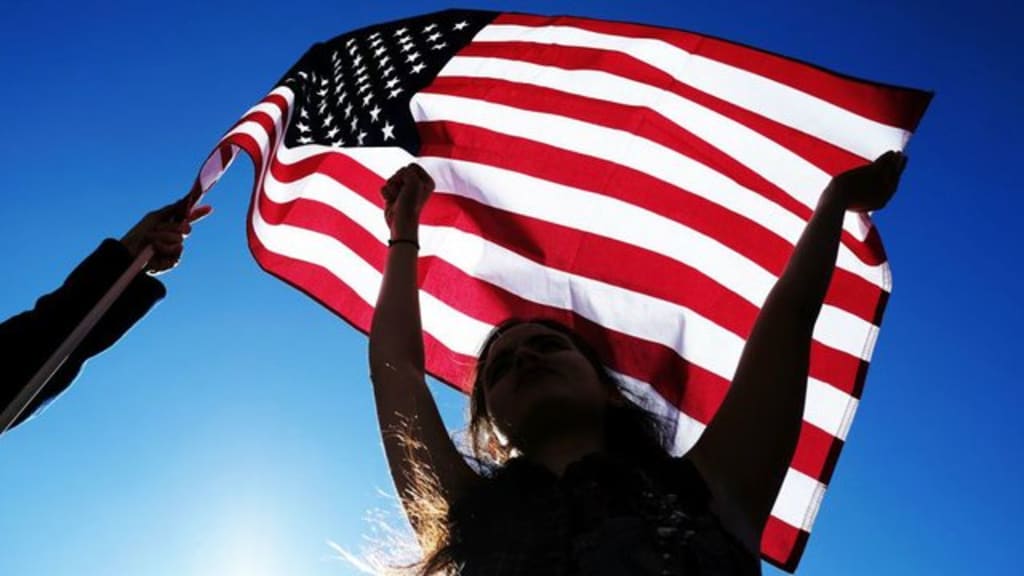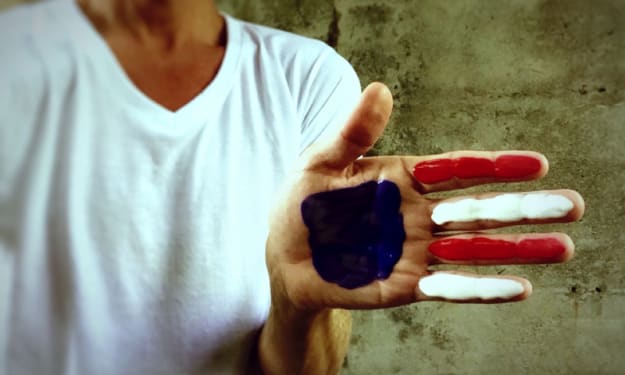A Young Experiment Failing Too Soon
Here's a look into how we the people are failing our own democracy.

When thinking of America, many ideals come to mind. Freedom, independence, liberty, and democracy prove as the standout values that the country holds dear. Just as any other country, a deep history holds the key to understanding how those ideals came to be. The past is a book of learning lessons, and if the lessons aren’t learned, history repeats itself. Upholding democracy stands as an international challenge, and although still young, America appears as the role model. However, the American democracy has been dwindling. The struggling democracy of America should be blamed on the American people, because Americans buy into partisan politics, create evils like that of superdelegates, fail to correct the short-comings of the executive branch, and fail to fulfill basic citizen duties.
American political leaders stand as the first pillar of the failing democracy. Throughout modern history, strong political figures quickly lose their equitability. Why? Partisan politics. Americans value competition. With a two-party system, it becomes easy to develop an “us vs. them” mentality, and both Democrats and Republicans embrace the side-picking. Because either side stands a good chance at winning, campaigns are hard fought. Campaign contributions introduce misconduct, as they become a tool of manipulation. The personal agendas of politicians overrule the greater good, and delegates tend to only follow party lines instead of individual candidates. When running for any office, most politicians depend on campaign contributions to help them achieve a successful run. “Just as troubling to a functioning democracy as classic quid pro quo corruption is the danger that officeholders will decide issues not on the merits or desires of their constituencies, but according to the wishes of those who have made large financial contributions valued by the officeholder,” (Gamawa 2012).
Super PACs and the massive amount of funding they provide now possess a great amount of power when it comes to campaign funding. A PAC is a Political Action Committee that is organized to raise and spend money to elect a specific candidate running for office. Super PACs, are the same as a regular PAC, they’re just much more powerful. They have been around since 1944, and PACs can donate up to $5,000 per candidate per election. Some popular ones are Future Majority and America First. When these PACs are successful in helping a candidate get elected into office, the candidate becomes accountable to their constituents. It becomes a game of bribery, and the candidate’s political agenda is often made by the people who got them into office in the first place.
This leads to the danger of personal interests. Politicians have evolved to become self-interested, as opposed to focusing on Americans and the greater good. The advancements of super PACs and political involvement by other bodies such as think-tanks and interest groups, the amount of money available to mud-sling one’s opponents proves greater than ever. In 2012, campaign spending totaled $138.6 million in the presidential race, and 68% of that went to negative campaigning. “We are bombarded with messages telling us that candidates, politicians, and even the government are corrupt, incompetent failures,” (Phillips 2012). Because of the clear division between political parties, both sides want “their side” to win any political race. Introduce the electoral college to this battle, and each delegate wants to keep their state and their constituents happy by voting for the candidate who follows their state’s political party. For example, look at Wyoming. The state hasn’t voted Democrat in a Presidential election since 1964, and only four times in the state’s entire history. Wyoming proves to be an extremely red state, yet it shows that it’s possible for a candidate’s success to be determined the minute they announce their political party they’re running under.
This brings in the looming threat of superdelegates. In 1982, the Democratic party introduced superdelegates to the electoral college. In the late 1970s and early 80s, the Democratic party began to see their support decline rapidly. In response to that significant loss of support, democratic leaders felt they needed a way to bring the control of their party and the country back into the hands of trusted democratic political leaders. “The records paint a picture of a group eager to win and convinced that, in order so, it must return control of the nominating process to top officials,” (Marcetic 2016). This 1982 Hunt Convention resulted in the creation of superdelegates. “Unlike the rest of the delegates—who are pledged to certain candidates based on the outcomes of their state’s primaries or caucuses—superdelegates are unbound, mean they can support any candidates they choose,” (Kaplan 2016). An in-depth analysis of Superdelegates from In These Times, stated that “Superdelegates don’t represent the people…they do what they personally think is right,” (Marcetic 2016). Fast-forward to the modern day, and their power stands unknown and uncontested.
Looking at the national primary of the 2016 election, Hillary Clinton stood as the clear front-runner against her closest competitor, Bernie Sanders. This advantage, brought on by the Superdelegates she had in her corner, gave her the upper hand in winning the Democratic nomination. “Seventy-three percent of Superdelegates—520 of the 712—have pledged their support to the former secretary of state,” (Marcetic 2016). “Both Grayson and Cohen point out that the Democratic superdelegates are uniquely undemocratic in the American party system. The Republican equivalent—168 party members who are guaranteed a vote at the convention—must vote in line with their respective states and only compromise 7 percent of the total delegates, compared to the DNC superdelegates’ 15 percent,” (Marcetic, 2016). Their power proves a direct hindrance of democracy and a slam to what our Founders had envisioned for the Electoral College, and is most certainly an aim at gaining personal political gain at the expense of the country and the American people.
It’s important to recognize the executive branch’s history of sneaking around. It began in 1968 with the Vietnam War. “The Vietnam War was at the heart of 1968, a heart, of darkness,” (Films Media Group 2004). The Vietnam War was an event that did not sit well with most Americans because the executive branch kept it so secret. There was little truth conveyed to the public. With 1972 came the Watergate Scandal, featuring President Nixon’s attempts to obtain secret documents on the upcoming election. “The distinction between the skepticism of the past and the cynicism of the present is important: what might be perceived as a difference in degree is actually a difference in kind,” (Rosenthal 2003). Since this era, Presidents have made countless “under-the-table” deals to help them into power, some of which Americans know of, some of which they never will.
Despite failures from the top down, the biggest threat to American democracy is the threat the American people pose to themselves. Americans seem to be failing to perform their civic duties or practice the power they hold. In American history, voter turnout proves to be continuously decreasing. Although millennials seem to be the most passionate age group when it comes to both political and social issues, their absence at the voting booth is quite apparent. “And, so their political power is likely to grow in the coming years. But, as the Pew analysis points out—this all refers to potential, not actual political clout. Only about 46 percent voted in the last presidential election; compared to 72 percent of the Silent Generation, who habitually punch above their weight,” (Khalid, 2016). This young generation proves passionate, but without voting action, they speak a bunch of empty words. “Across our country, not one state in the nation has a voter turnout rate higher than 65%,” (Simon, 2017). On an international scale, the United States ranked 12th out of the 15 democratic nations when it comes to voter turnout. Overall, only 56.9% of Americans show up to vote. American’s lack of involvement is dangerous because it opens the door for society to develop into a dictatorship, as no one stands to check the government, except the government itself.
Not only are Americans inactive, but are also uneducated. Across America, only 35% of public schools require their students to take a government class to graduate. “It is rather rare, in fact, to find an American government course required in secondary schools. The subject of citizenship is taken up by instances of social studies curriculums. Students, in any case, are indifferent to learning about politics and government,” (Rosenthal 2003). This creates a highly uneducated younger generation, who, when thrust out into the voting world with no clear understanding of how our government works, struggles to understand what each candidate stands for. A long-discussed option to solving this problem is the concept of a competency principle at voting booths. Jason Brennan, with Philosophical Journal, (2011) reports:
When elections are decided on the basis of unreliable epistemic procedures or on the basis of unreasonable moral attitudes, this exposes the governed to undue risk of serious harm. This concludes the basic argument for restricted suffrage. When high-stakes decisions are imposed upon innocent people, the Competence Principle requires every individual decision to be made competently and reasonably by competent and reasonable people.
The right to vote stands as a privilege that should be taken seriously, and the outcome proves too serious of an issue to leave to uneducated citizens.
The media industry and the press can fail political policies as well. Our Founders recognized the importance of a free press and its ability to serve as a bulwark to protect citizens’ rights against the government’s abuses. However, in the status quo, almost every news network presents some bias towards one of the two political parties. In 2014, CNN reporter Chris Cuomo admitted in an interview that “We couldn’t help Hillary Clinton any more than we have; she’s gotten just a free ride so far from the media; we are the biggest ones promoting her campaign,” (Milikh 2017). This biased approach allows media outlets to “brainwash” Americans into believing their side on every issue they report. Without learning of the bias, or learning how government works, younger participants stand at an all-time high of press manipulation. “The implication of Cuomo’s admission—that the press should dominate the public mind in service of its prejudices and interests—shows a dangerous misunderstanding of the purpose of this institution’s role in our republic, and a shallow view of the stakes involved,” (Milikh 2017).
The final danger the people pose comes in the form of interest groups. In Federalist No. 10, written in 1787, James Madison discussed the dangers of factions within a country. “Among the numerous advantages promised by a well-constructed Union, none deserves to be more accurately developed than its tendency to break and control the violence of faction,” (Diamond 2016). The tiny divisive tactics they use prove dangerous to society and the ability to come together as a country. Interest groups grassroots lobby for issues regarding racism, sexism, abortion, gun control, etc. all of which distract from more pressing political issues.
American democracy remains an internationally recognized concept appreciated by most individuals that live under it. However, over the past sixty years, that prized institution has been on the decline due to several shortcomings of the American people. “The Framers defined political corruption to include ‘self-serving use of public power for private ends, including, without limitation, bribery, public decisions to serve private wealth made because of dependent relationships, public decisions to serve executive power made because of dependent relationships, and use by public officials of their positions of power to become wealthy,’’ (Gamawa 2012). In the status quo, corruption is seen from the president, to the corporation, to the American. If the country does not recognize the threat these misconducts present, the democracy can crumble just like the Roman and Greek empires. The question stands, what is the first step to turning back these mistakes?
About the Creator
Rae'Lee Klein
Rae'Lee Klein was born and raised in Cheyenne Wyoming.She attends Arizona State University, where she is double majoring in Journalism and Political Science. She hosts two shows on Blaze Radio, a top five college radio station in the U.S.






Comments
There are no comments for this story
Be the first to respond and start the conversation.